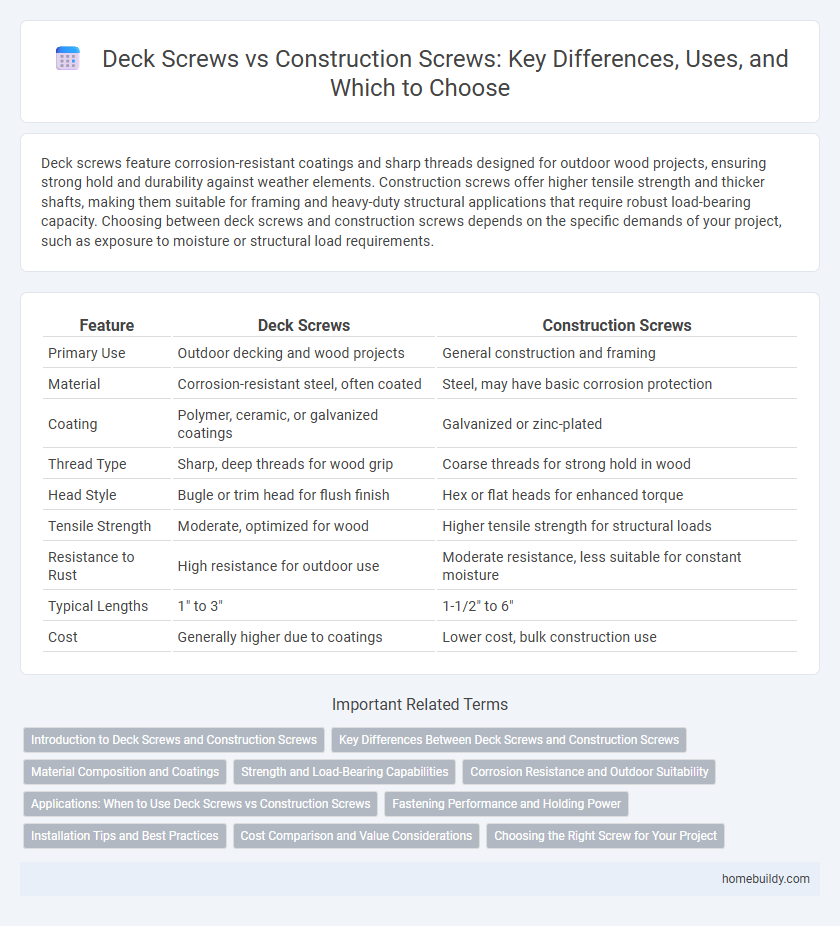Deck screws feature corrosion-resistant coatings and sharp threads designed for outdoor wood projects, ensuring strong hold and durability against weather elements. Construction screws offer higher tensile strength and thicker shafts, making them suitable for framing and heavy-duty structural applications that require robust load-bearing capacity. Choosing between deck screws and construction screws depends on the specific demands of your project, such as exposure to moisture or structural load requirements.
Table of Comparison
| Feature | Deck Screws | Construction Screws |
|---|---|---|
| Primary Use | Outdoor decking and wood projects | General construction and framing |
| Material | Corrosion-resistant steel, often coated | Steel, may have basic corrosion protection |
| Coating | Polymer, ceramic, or galvanized coatings | Galvanized or zinc-plated |
| Thread Type | Sharp, deep threads for wood grip | Coarse threads for strong hold in wood |
| Head Style | Bugle or trim head for flush finish | Hex or flat heads for enhanced torque |
| Tensile Strength | Moderate, optimized for wood | Higher tensile strength for structural loads |
| Resistance to Rust | High resistance for outdoor use | Moderate resistance, less suitable for constant moisture |
| Typical Lengths | 1" to 3" | 1-1/2" to 6" |
| Cost | Generally higher due to coatings | Lower cost, bulk construction use |
Introduction to Deck Screws and Construction Screws
Deck screws feature corrosion-resistant coatings and coarse threads designed for securing decking materials to wood frames, ensuring strong holding power and durability in outdoor environments. Construction screws offer greater versatility with various head types and thread designs suited for framing, fastening drywall, and general construction tasks, providing enhanced strength for structural applications. Both types are engineered to reduce stripping and improve drive efficiency, but deck screws prioritize weather resistance while construction screws focus on multi-purpose strength.
Key Differences Between Deck Screws and Construction Screws
Deck screws feature corrosion-resistant coatings and sharper threads specifically designed for outdoor wood applications, ensuring strong grip and durability in exposed environments. Construction screws typically have thicker shafts and blunt threads, providing enhanced holding power in framing and heavy-duty structural projects. The choice between deck screws and construction screws depends on factors such as weather exposure, wood type, and load requirements.
Material Composition and Coatings
Deck screws typically feature corrosion-resistant materials such as stainless steel or coated carbon steel, often enhanced with epoxy or ceramic coatings to withstand outdoor moisture and prevent rust. Construction screws are generally made from hardened steel with zinc or phosphate coatings designed to provide durability and resistance against wear in structural applications. The specific material composition and coating directly influence the screws' performance, longevity, and suitability for either decking or general construction projects.
Strength and Load-Bearing Capabilities
Deck screws feature hardened steel and corrosion-resistant coatings, delivering superior shear strength and holding power for outdoor wood decking applications. Construction screws, often made from high-tensile steel with specialized thread designs, provide enhanced load-bearing capabilities for framing and structural assemblies. Comparing tensile strength ratings, deck screws typically range from 80 to 100 MPa, whereas construction screws can exceed 120 MPa, making them ideal for heavy-duty construction tasks.
Corrosion Resistance and Outdoor Suitability
Deck screws feature advanced corrosion-resistant coatings such as ceramic or polymer, making them ideal for prolonged outdoor exposure and maintaining structural integrity in moist environments. Construction screws, while sturdy, often possess less specialized coatings and may require additional protection in outdoor or high-humidity applications to prevent rust. Selecting screws with high-grade stainless steel or coated surfaces enhances durability and reliability for decking and external construction projects.
Applications: When to Use Deck Screws vs Construction Screws
Deck screws are specifically designed for outdoor use, offering corrosion resistance and holding power ideal for wood decking and exterior projects exposed to weather. Construction screws provide higher shear strength suitable for structural framing, heavy-duty fastening, and interior applications where load-bearing is critical. Selecting between deck screws and construction screws depends on environmental exposure and load requirements of the project.
Fastening Performance and Holding Power
Deck screws feature a corrosion-resistant coating and coarse threads that maximize gripping power in wood, ensuring strong fastening performance and long-lasting hold on outdoor deck boards. Construction screws typically have a harder steel core and a self-drilling tip designed for penetrating tougher materials like metal or engineered wood, offering superior holding power in structural applications. Both types prioritize durability, but deck screws excel in resisting weather exposure while construction screws provide enhanced shear strength and load-bearing capacity.
Installation Tips and Best Practices
When installing deck screws, using a high-torque drill with a clutch setting prevents overdriving and reduces wood splitting, ensuring a secure hold in treated lumber. Construction screws require pre-drilling in hardwoods to avoid wood damage and to maintain fastener integrity during fastening. Both types benefit from corrosion-resistant coatings and proper pilot hole sizing to enhance durability and structural stability in outdoor applications.
Cost Comparison and Value Considerations
Deck screws typically cost more than construction screws due to their corrosion-resistant coatings and specialized thread design for wood decking. Construction screws offer a lower upfront price but may lack the durability and longevity required for outdoor applications, potentially increasing long-term maintenance expenses. Evaluating cost versus value involves considering initial investment against lifespan and performance in specific project environments.
Choosing the Right Screw for Your Project
Deck screws feature corrosion-resistant coatings and coarse threads designed for outdoor wood applications, ensuring strong holding power and durability. Construction screws offer versatility with varying thread patterns and lengths suitable for framing, drywall, and general woodworking tasks. Selecting the right screw depends on the material, exposure conditions, and load requirements specific to your project.
deck screws vs construction screws Infographic

 homebuildy.com
homebuildy.com